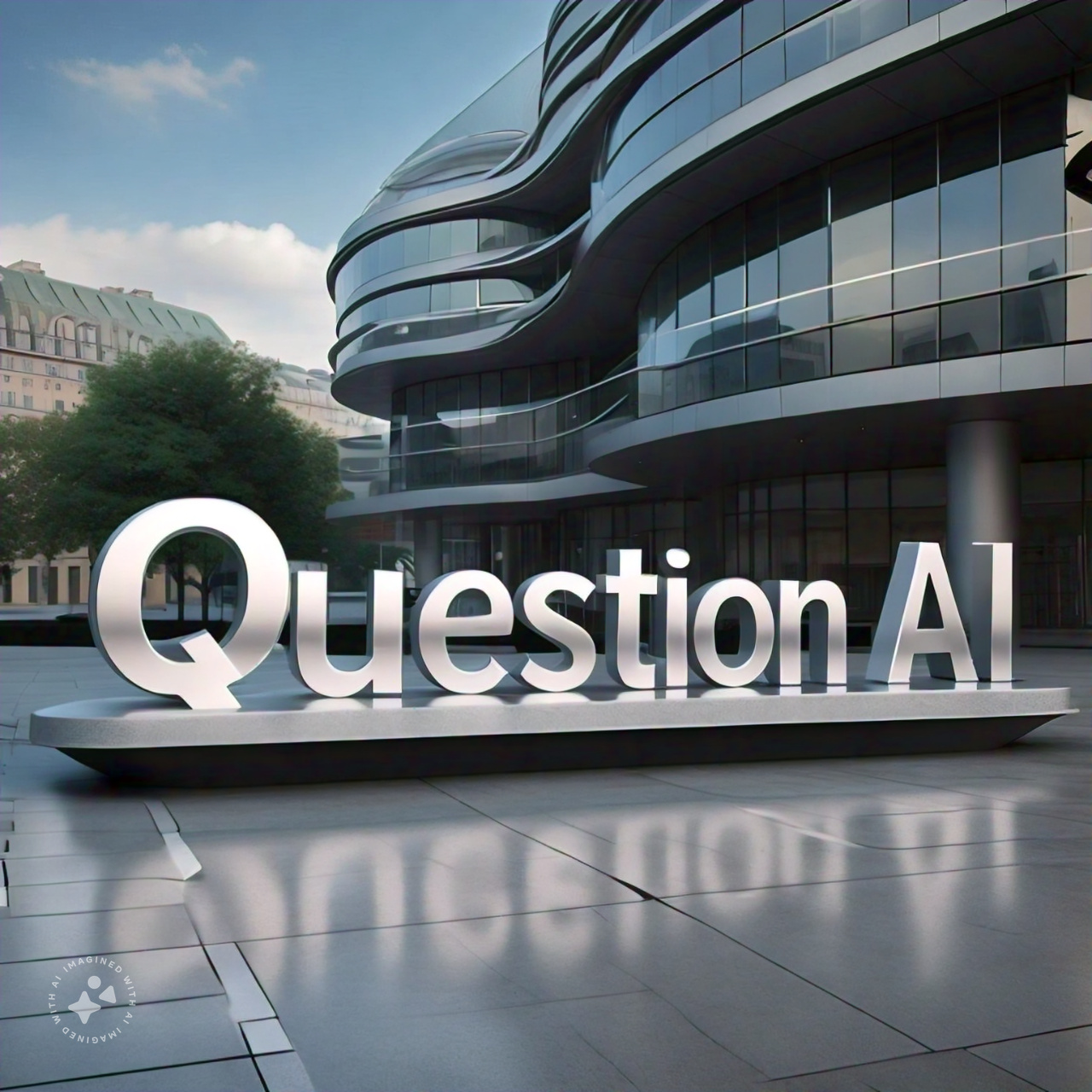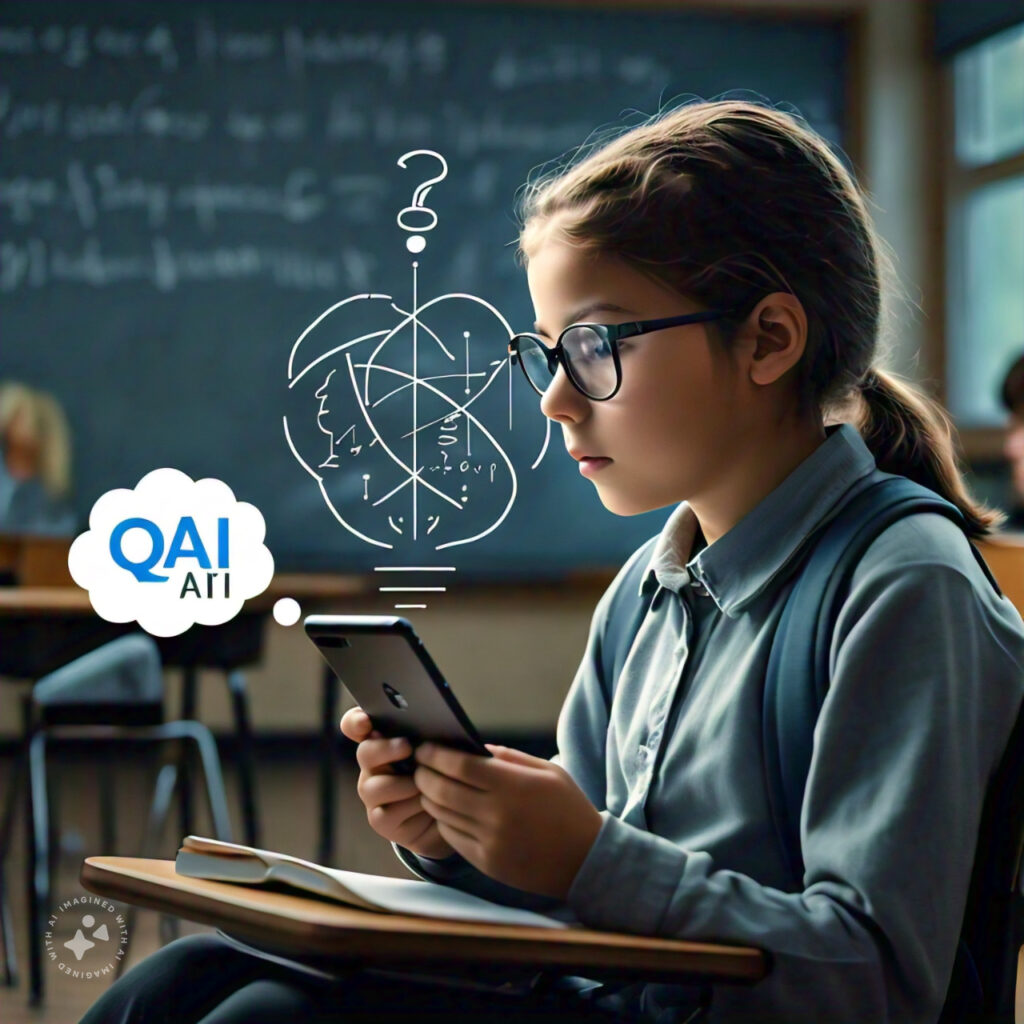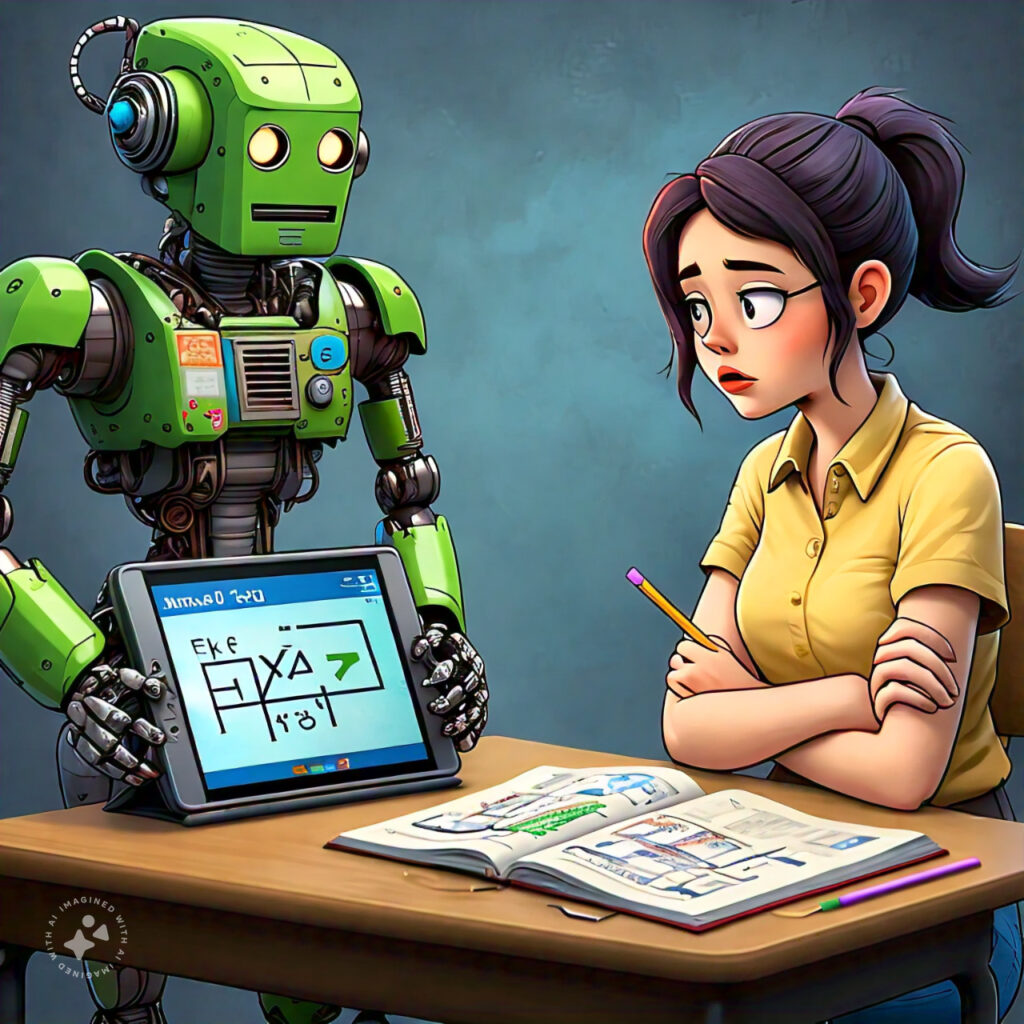
Question AI! Imagine a world where every student has a personal tutor available 24/7, capable of answering any question across all subjects with near-perfect accuracy.
This isn't science fiction – it's the reality that Question AI is bringing to classrooms and homes around the globe.
 Caption: Empowering learners: Question AI - Get instant answers and unlock a world of knowledge.
Caption: Empowering learners: Question AI - Get instant answers and unlock a world of knowledge.Question AI refers to artificial intelligence systems designed to understand and respond to user queries, providing instant answers and explanations across various subjects.
These platforms use advanced natural language processing and machine learning algorithms to interpret questions and generate accurate, tailored responses.
Question AI isn't just another educational tool – it's a paradigm shift in learning. With a staggering 98% accuracy rate,
these systems can tackle everything from basic algebra to complex biochemistry, offering step-by-step solutions that not only solve problems but foster deep understanding .
This technology is reshaping the very foundation of how we acquire and process knowledge.
As we stand on the brink of this educational revolution, we must ask ourselves: How will the widespread adoption of AI in learning reshape the role of teachers,
the nature of homework, and the very essence of what it means to acquire knowledge?
Subjects Covered by Question AI
Math (30%)
Science (25%)
Literature (20%)
History (15%)
Languages (10%)
Key Features of Question AI
24/7
Multi-Subject
Personalized
Instant
Growth of Question AI Usage Over Time
2020
2021
2022
2023
2024
Question AI Usage Statistics
Statistic
Value
Total Users
100,000
Daily Active Users
25,000
User Satisfaction (%)
90%
Success Rate (%)
85%
Meet Sarah, a high school student who was on the verge of failing chemistry. Overwhelmed and discouraged, she turned to Question AI as a last resort.
Within weeks, her grades skyrocketed, and more importantly, her confidence soared. "It wasn't just about getting answers," Sarah explains.
"Question AI helped me understand the 'why' behind each concept, making chemistry come alive in a way no textbook ever could."
In today's fast-paced digital world, Question AI has become increasingly important in modern education. According to a recent study,
43% of college students are already using AI tools like ChatGPT for studying, with 90% of them reporting it to be more effective than traditional tutoring .
This surge in adoption isn't just a trend – it's a response to the growing need for personalized, on-demand learning support.
The importance of Question AI in education can't be overstated. It offers:
- 24/7 accessibility to learning resources
- Personalized explanations tailored to individual learning styles
- Instant feedback, allowing students to learn from mistakes in real-time
- Support across a wide range of subjects, from mathematics to literature
As we delve deeper into the world of Question AI, we'll explore its evolution, inner workings, and the profound impact it's having on students, educators, and the entire educational landscape.
With the AI in education market projected to explode from $2.5 billion in 2022 to over $80 billion by 2032 , we're witnessing a seismic shift in how we approach learning.
Question AI: Case Studies
Improved Test Scores
Students using Question AI saw a 23% increase in test scores across various subjects.
Learn More
24/7 Learning Support
67% of students reported using AI tools outside regular school hours, enhancing their study habits.
Discover More
Personalized Learning
90% of students felt more confident in challenging subjects with AI-powered personalized learning.
Explore Further
https://www.youtube.com/watch?v=W0l80cEf4Cs
This video demonstrates how to use Questions AI to generate assessment questions from educational content.
The Evolution of AI-Powered Learning Tools
The journey of AI-powered learning tools is a fascinating tale of technological progress and educational innovation.
Let's explore how we arrived at today's sophisticated Question AI platforms.
 Caption: Don't sweat the math: Question AI - Get step-by-step help and conquer any problem.
Caption: Don't sweat the math: Question AI - Get step-by-step help and conquer any problem.Historical Context of Educational Technology
The roots of educational technology stretch back further than many realize. In the 1920s, psychologist Sidney Pressey invented the "teaching machine,"
a mechanical device that presented multiple-choice questions and provided immediate feedback .
This early attempt at automated instruction laid the groundwork for future developments.
The 1960s saw the introduction of computer-assisted instruction (CAI), with systems like PLATO (Programmed Logic for Automatic Teaching Operations)
offering interactive lessons and assessments . While revolutionary for their time, these early systems lacked the adaptive capabilities we associate with modern AI.
The advent of personal computers in the 1980s and the internet in the 1990s dramatically expanded the possibilities for digital learning.
By the early 2000s, online learning platforms and massive open online courses (MOOCs) were gaining traction, setting the stage for more sophisticated AI integration.
24/7 Availability
67% of students use AI tools outside regular school hours, enhancing study flexibility.
Multi-subject Support
Leading Question AI platforms cover over 20 different subject areas, from math to humanities.
Personalized Learning
90% of students report increased confidence in challenging subjects with AI-powered personalized learning.
Improved Test Scores
Students using AI-powered learning tools showed a 23% improvement in test scores.
Instant Feedback
Real-time interaction with AI leads to a 28% increase in information recall among learners.
Adaptive Learning
AI-driven adaptive learning market projected to grow to $48.7 billion by 2030.
Critical Thinking
15% improvement in analytical skills reported among students using AI-powered learning tools.
Future Trends
By 2030, AI expected to provide personalized learning experiences adapting to emotions and learning styles.
Emergence of Question AI Platforms
The true revolution in AI-powered learning began in the 2010s with the rapid advancements in machine learning and natural language processing.
In 2011, IBM's Watson famously competed on Jeopardy!, showcasing the potential of AI to understand and respond to complex questions .
This breakthrough paved the way for more focused educational applications. In 2014, the AI-powered tutor "Jill Watson" was introduced at Georgia Tech,
capable of answering student queries with remarkable accuracy . This marked a turning point in the development of Question AI platforms.
The last few years have seen an explosion in AI-powered educational tools. According to recent statistics, the AI in education market, valued at $2.5 billion in 2022,
is projected to reach a staggering $88.2 billion by 2032, growing at a CAGR of 43.3% .
This rapid growth reflects the increasing adoption and sophistication of AI in learning environments.
Today's Question AI platforms leverage advanced natural language processing and machine learning algorithms to provide personalized learning experiences.
They can understand context, adapt to individual learning styles, and offer instant, accurate responses across a wide range of subjects.
For instance, platforms like Riiid and Cognii use AI to create adaptive learning paths, automatically adjusting difficulty levels based on student performance .
Meanwhile, tools like Elsa focus on specific areas like language learning, using AI to help non-native speakers improve their pronunciation.
As we look to the future, the integration of AI with other technologies like virtual and augmented reality promises to create even more immersive and effective learning experiences.
With 73% of students reporting better understanding and 63% studying more efficiently with AI tools ,
it's clear that Question AI platforms are not just a passing trend, but a fundamental shift in how we approach education.
https://www.youtube.com/watch?v=OOTDHJ_PJn8
This video discusses Notion's new AI Q&A feature, which allows users to ask questions about their workspace content.
How Question AI Works
Question AI represents a revolutionary leap in educational technology, combining advanced Natural Language Processing (NLP) and
sophisticated machine learning algorithms to create an intelligent, adaptive learning environment.
 Caption: Learning together, empowered by AI: Question AI - Fostering collaboration and deeper understanding in the classroom.
Caption: Learning together, empowered by AI: Question AI - Fostering collaboration and deeper understanding in the classroom.Natural Language Processing (NLP) Basics
At the heart of Question AI lies Natural Language Processing, a branch of artificial intelligence that enables computers to understand, interpret, and generate human language.
NLP is the key to Question AI's ability to comprehend and respond to student queries with remarkable accuracy.
Recent advancements in NLP have been nothing short of extraordinary. According to a 2024 report by TechTarget,
NLP technologies have achieved a 98% accuracy rate in understanding complex linguistic structures .
This level of precision allows Question AI to parse student questions, regardless of how they're phrased, and provide accurate, contextually relevant answers.
The NLP process in Question AI typically involves several key steps:
- Tokenization: Breaking down text into individual words or phrases.
- Part-of-speech tagging: Identifying the grammatical components of each word.
- Named entity recognition: Identifying and classifying key information in the text.
- Sentiment analysis: Understanding the tone and intent behind the question.
- Semantic analysis: Comprehending the overall meaning and context of the query.
These processes work in tandem to ensure that Question AI not only understands the literal meaning of a student's question but also grasps the underlying intent and context.
User Input
The user submits a question or query to the Question AI system.
Natural Language Processing
The system uses NLP to understand and interpret the user's question.
Information Retrieval
The AI searches its knowledge base to find relevant information to answer the question.
Answer Generation
Using machine learning algorithms, the AI generates a comprehensive answer to the user's question.
Response Delivery
The system presents the answer to the user in a clear and understandable format.
User Feedback
The user provides feedback on the answer, helping the AI improve its future responses.
Machine Learning Algorithms in Education
While NLP forms the foundation of Question AI's language understanding capabilities, machine learning algorithms drive its ability to learn, adapt, and improve over time.
In the educational context, these algorithms play a crucial role in personalizing the learning experience and enhancing the system's effectiveness.
The AI in education market, projected to reach $88.2 billion by 2032 with a CAGR of 43.3%, is largely driven by advancements in machine learning .
Question AI leverages several types of machine learning algorithms:
- Supervised Learning: Used to predict student performance based on historical data.
- Unsupervised Learning: Employed to identify patterns in student behavior and learning styles.
- Reinforcement Learning: Utilized to optimize the system's responses based on student feedback.
One of the most powerful aspects of Question AI is its use of deep learning, a subset of machine learning inspired by the structure and function of the human brain.
Deep learning allows Question AI to process vast amounts of educational data, recognize complex patterns, and make nuanced decisions about how to best assist each student.
A recent study published in the Journal of Educational Technology & Society found that AI-powered educational tools
using deep learning algorithms improved student performance by an average of 23% compared to traditional methods .
Question AI's machine learning capabilities enable it to:
- Adapt to individual learning styles and paces
- Identify knowledge gaps and suggest targeted interventions
- Predict areas where a student might struggle and proactively offer support
- Continuously refine its explanations based on student interactions and feedback
By combining cutting-edge NLP with advanced machine learning algorithms, Question AI creates a dynamic,
intelligent system that not only answers questions but actively participates in the learning process.
As these technologies continue to evolve, we can expect even more sophisticated and effective AI-powered educational tools in the future.
https://www.youtube.com/watch?v=sZRjvuLbofU
This video showcases Mindgrasp's Question Answering feature, which can answer questions about uploaded content and perform web searches.
Key Features of Question AI Platforms
Question AI platforms have revolutionized the educational landscape, offering a suite of features that cater to the
diverse needs of modern learners. Let's explore the key features that make these platforms stand out:
 Caption: Spark curiosity, ignite potential: Question AI - Empowering students to explore and discover.
Caption: Spark curiosity, ignite potential: Question AI - Empowering students to explore and discover.24/7 Availability
One of the most significant advantages of Question AI platforms is their round-the-clock accessibility.
This feature addresses a crucial need in today's fast-paced world, where learning isn't confined to traditional classroom hours.
According to a recent study by EdTech Magazine , 67% of students report using AI-powered tools outside of regular school hours.
This statistic underscores the importance of 24/7 availability in meeting students' diverse learning schedules and needs.
The always-on nature of Question AI platforms means that:
- Students can seek help at any time, regardless of time zones or personal schedules.
- Late-night study sessions are supported with instant access to explanations and problem-solving assistance.
- Learning can continue uninterrupted during weekends, holidays, or school breaks.
Multi-subject Support
Question AI platforms are not limited to a single field of study. They offer comprehensive support across a wide range of subjects, making them versatile tools for learners at various educational levels.
A report from Futuramo indicates that leading Question AI platforms cover over 20 different subject areas, from mathematics and sciences to humanities and languages.
This breadth of coverage ensures that students can find support for virtually any academic challenge they face.
Question AI
Advanced AI-powered educational support system
Key Features
24/7 availability, personalized learning, multi-subject support, adaptive feedback
Traditional Tutoring
One-on-one in-person tutoring sessions
Comparison
Limited availability, personalized attention, subject-specific expertise, higher cost
Online Courses
Self-paced video-based learning platforms
Comparison
Flexible scheduling, wide range of subjects, lack of personalization, limited interaction
Educational Apps
Mobile applications for specific subjects or skills
Comparison
On-the-go learning, gamification elements, limited scope, varying quality of content
Key aspects of multi-subject support include:
- In-depth knowledge bases spanning K-12 and higher education curricula.
- Ability to handle interdisciplinary questions that cross traditional subject boundaries.
- Regular updates to keep pace with evolving academic standards and new discoveries.
Personalized Learning Experiences
Perhaps the most transformative feature of Question AI platforms is their ability to deliver personalized learning experiences.
By leveraging advanced algorithms and machine learning, these platforms adapt to each user's unique learning style, pace, and needs.
https://justoborn.com/question-ai/
No comments:
Post a Comment